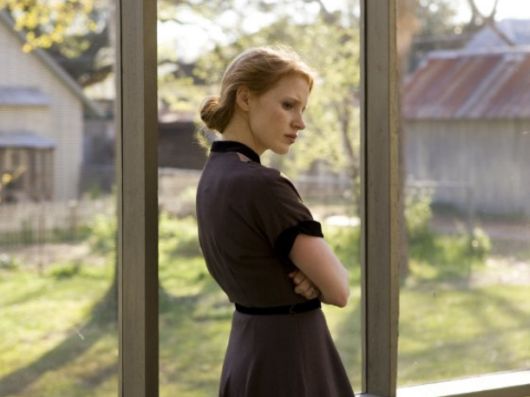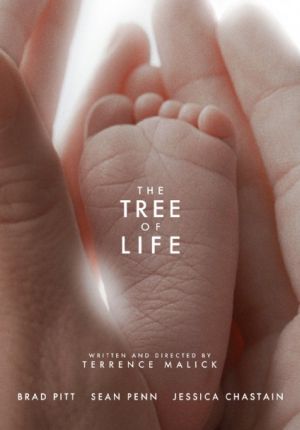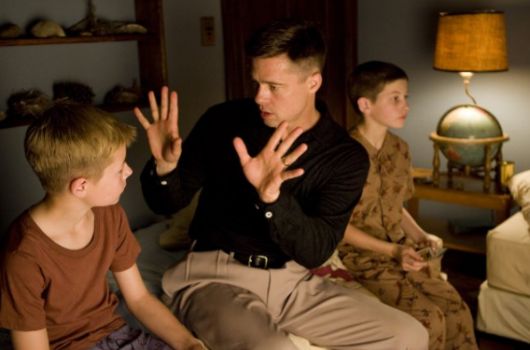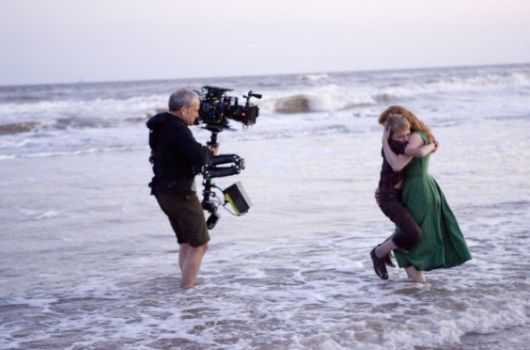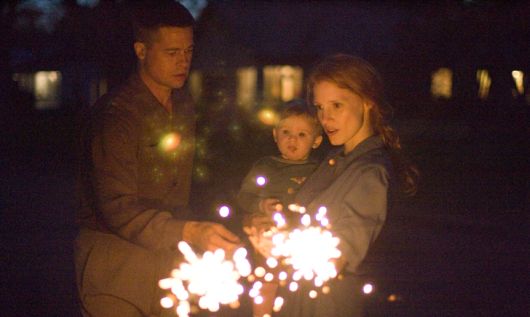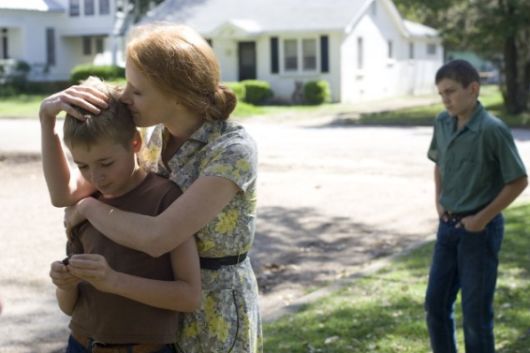 FILM
FILM In Which We Become Brad Pitt At Great Cost
 Monday, December 12, 2016 at 10:40AM
Monday, December 12, 2016 at 10:40AM 
It's All Very Real
by DICK CHENEY
Allied
dir. Robert Zemeckis
124 minutes
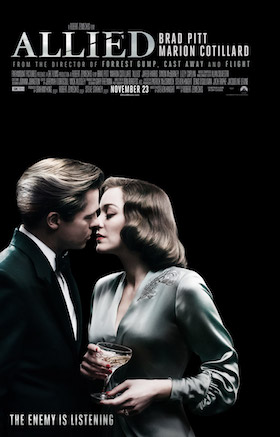 It is an important human tradition that all great couples begin to resemble one another. Brad Pitt's eyes have slowly been rendered heavy-liddled; his skin hardening into a flat, slightly leathery carapace. The moment he sees Marion Cotillard he is mainly shocked that a person could look any different. "Now this is the part where I tell you I love you," she whispers to Pitt on a rooftop. The Canadian intelligence officer (these apparently exist) whose role Pitt inhabits in Allied is quite deliberate and cautious, but he has to be. If he perishes in Casablanca, Canada's contribution to the Second World War will be vanquished as well.
It is an important human tradition that all great couples begin to resemble one another. Brad Pitt's eyes have slowly been rendered heavy-liddled; his skin hardening into a flat, slightly leathery carapace. The moment he sees Marion Cotillard he is mainly shocked that a person could look any different. "Now this is the part where I tell you I love you," she whispers to Pitt on a rooftop. The Canadian intelligence officer (these apparently exist) whose role Pitt inhabits in Allied is quite deliberate and cautious, but he has to be. If he perishes in Casablanca, Canada's contribution to the Second World War will be vanquished as well.
Just kidding, Canada, and I'm sorry that Trailer Park Boys became so awful, and thus your only contribution to civilization besides allowing a lot of television shows to be shot in Vancouver is now impotent. Even more sadly, Pitt never even attempts a Québécois accent. Pitt does speak a bit of French in Allied, and it never really makes too much sense that most of the characters speak English: switching back and forth only reminds us how inauthentic it all is.
The rumor, of course, was that Pitt cheated on his wife with Cotillard. Watching Allied you can be fairly certain that this was never the case. At one point Pitt kisses her on the forehead like a sweet friend that you maybe stick your penis into one night after work and then every time you see each other after that it's a little awkward, but the memory is hardly painful.
You never fucked a friend? Good. He never lets you forget it.

Allied was something far short of a box office smash. In fact it lost a substantial amount of money after you factor in the considerable marketing budget. Sometimes a movie will thrive on gossip, but no one really wanted to see these two older people in coitus, especially considering that we will never stop thinking about Brad yelling at his adopted children on their private plane.
Any movie about the past must tell us something about the present. The view of Nazism here is revoltingly casual; the war itself is a mere incidental background. The massacre of millions is nothing in light of the importance of the key romance here; despite that Pitt and Cotillard mostly seem exceedingly frosty to one another. The chemistry is not there at all, and director Robert Zemeckis (The Walk) is out of his depth trying to create it. Cotillard does have the capability of projecting an eminent sexuality, but Allied buttons her up way too much: she is at her most appealing when she is in the corner of the frame nowhere near the center, so elusive she might totally disappear if the wrong word is spoken, or the penis inserted in an unwelcome orifice.

What surrounds this misstep is no less dull. A period piece demands a certain sweeping music, and the score to Allied, by Alan Silvestri, comes across as more or less inchoate. The tone remains entirely off as Zemeckis vacillates between painfully bad scenes where the two senior citizens flirt with one another to supposedly tense moments while Pitt searches for a German official. The set design of Casablanca itself is a total mess — you never get any moment of foreignness, and there is absolutely no surprise here at all: Allied feels more like a Marlon Wayans-led satire of Lawrence of Arabia.

Cotillard gives birth in a somehwat unlikely scene with bombs falling in the background. Somehow Pitt has great personal wealth and the two settle down in England. Marion turns much softer then, and when Pitt wakes up next to her we understand how thrilling it is to have someone there for you, that you can touch at any time and who will touch you.
Marion makes a lot more sense as a dull English wife than a spy, but soon Pitt finds out she is probably working for the Germans and doesn't feel as attracted to her. Compounding the issue is that Marion never undresses for the sex scenes in Allied: the two consummate their marriage in this weird, fetishy, fully clothed wintercourse.

Neither of them feel very attached to the child, perhaps sensing on some level that it was the result of a faux union. The two relentlessly try to recreate their time in Morrocco, but it simply does not feel particularly right. Probably Marion would have just told her husband the truth in real life, but in this story she stays quiet even though Brad is super placid in this role, never once exploding in anger — just showing off some mild Canadian distaste.
It is ironic that the basic plot of Allied is that Brad suspects his wife, when he is actually the suspicious one. Why did Angelina dump this piece of garbage? The terms of the temporary custody agreement allowing Pitt access to his children are quite revealing: not only is he sentenced to a weekly therapy session with Los Angeles-based marriage counselor Ian Russ, he has to go with Angelina. This breakup, then, is in name only. He can never stop looking at her face, primarily because it is his own.
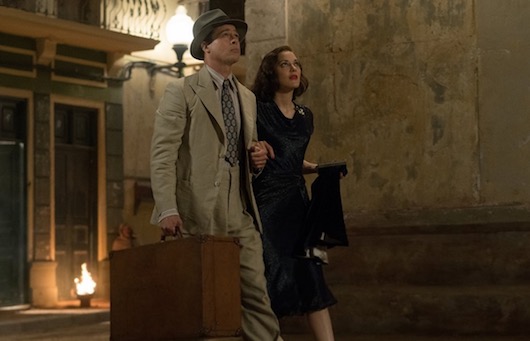
Brad also has to submit to drug and alcohol testing four times a month, which either should have gotten his lawyer fired, or is the measured consequence of the intense diet of cocaine, weed, and alcohol he samples in pursuit of a finer performance in his chosen profession. In Allied, the resulting exhibition is quite the tragic mess. Once we tire of the awkward interaction between the leads, Zemeckis introduces some peripheral characters to testify about the allegiance of Cotillard — one is a pained, squawking Lizzy Caplan who seems totally out of place in this retinue. God this was bad. Please don't see it. They probably should not have ever made a movie which required you to feel sympathy for Brad Pitt.
Dick Cheney is the senior contributor to This Recording.

 allied,
allied,  brad pitt,
brad pitt,  dick cheney,
dick cheney,  marion cotillard
marion cotillard 





































